WARNING : THERE ARE POTENTIAL SPOILERS
Doctor Who, unlike any other show, before it or since, has thrived on a world of change. The character’s basic premise of regeneration was built into the show to never have to rely on one single actor to take the role, and that the mantle could pass down from actor to actor generation to generation, era to era. The 2 part finale shown in the UK and US during the Christmas and New Year period was designed to leave you in no doubt, then end of an era began in 2005 was here.
In an incredibly dark tale for Doctor Who, (Yes, even darker than the previous Waters of Mars special) the End of Time was very much a tale of two halves, something Russell T. Davies multi-part scripts have always suffered from. The first half of the show, shown on Christmas Day in the UK and 26th December in the US, suffered from some poor decisions in regards to The Master. Bringing him back from the ring picked up after The Doctor’s Star Wars-esque funeral pyre last time we saw him was a given but now The Master had become unstable, leaving him dangerously unstable, eating the homeless, being able to jump huge distances and shoot thunderbolts of his energy from his hands. This destabilised the relationship with the Doctor, a relationship that had always been more Holmes-Moriarty than Bond vs his latest villain. During the Doctor’s encounters with The Master, we find that the drumming in his head isn’t just in his head, the Doctor gets to hear it. The Master isn’t (that) mad after all.
We found out more about Wilf, brilliantly portrayed once again by Bernard Cribbins. He quite easily finds The Doctor when he needs to, and his connection with him is in question. Just what is he to the Doctor? We get to meet Donna again, whose engaged to be married and The Doctor does he best to keep away from, for fear of killing her with her memory.
As the show reached the first half crescendo we learnt the master’s plan, to wipe out the humans and clone them into himself, the “Master” race as he called it. Of course, the Master’s actions aren’t the only threat. This is where Russell T. Davies’ ability to leave you jaw on the floor came to the fore. He was bringing back the Time Lords.
The first half of the show suffered from Russell T. Davies ability to write cliff hangers and strong second episodes, but not pace the scenes in the first half to compensate for this, and once again it showed. Perhaps it was the anticipation of the finale of Tennant’s time as The Doctor, but the first part of the special, with ten or so minutes at the end aside, wasn’t as strong as it could’ve been. Some of the scenes were badly acted with David Harewood, playing Joshua Naismith, a rich billionaire, particularly poor and chewing the scenery.
The second half of the show continues Russell’s two part formula, and gave us a brilliant example of how his deft handling of the show’s return has given Britain a TV show we can truly be proud of on the world stage. Opening with a flashback to the Last Day of the Time War, we learn that The Time Lords are responsible for the drumming sound that The Master suffers, and implant it, and use it as a link between Earth and Galifrey on the final day of the Time War, to escape the Doctor’s genocidal move to end the War. If some newer fans thought the Time Lords were a good people, well think again. This is proven early on in the episode when Rassilon uses a gauntlet glove to disintegrate one of his own. These guys aren’t nice. Not at all. Timothy Dalton, playing the High President Rassilon was at his authoritative best, lending a great gravitas to such a pivotal role.
Some of the acting work between Tennant and Simm in this episode was simple beautiful, an amazing example of how two of Britain’s best acting talents can feed and work from each other. The story was presented in a much more coherent manner, even though once again Russell T. Davies was very easily able to let the cliffhanger peril fade in a damp squib, and incidental rather than the threat we were perceiving it to be.
There is a beautiful twist, that I won’t state here (anyone who has seen it knows already what I mean) but is done with hardly any signposting to the point that it creeps up on you, and then the penny finally drops. Its superbly handled and once again shows the Doctor at his best. The biggest things aren’t always the things that put you in peril, its the littlest.
The beauty of this episode really lies in the last 20 minutes. Everything is wrapped up neatly in just over an hour, but they reserve 20 minutes to give the Doctor a proper send off, giving him as he calls it his “reward”. We find out the fates of several of the Doctor’s companions along the way, including surprise cameos from Noel Clarke and Freema Agyeman, as well as finding out how Jack Harkness has been filling his time since leaving Earth at the end of the Children of Earth Torchwood specials, meeting Midshipman Frame of the SS Titanic again and leaving a potential future career path open for Russell Tovey in the next season of Torchwood. We say a touching goodbye to Rose, with the Doctor going to see the fresh, young excitable girl we first met in 2005 (even though she seems barely recognisable now compared to then). We even (in Jack Harkness’ scenes) get to hear the sounds of Yamit Mamo, singer on the SS Titanic from the the Voyage of the Damned episode and also the singer of that episode’s theme song “Stowaway”. Yes, literally everyone was back to say goodbye, but it was very subtle really. We got to meet everyone and say goodbye not only to the Doctor, but to his friends and companions on the way, closing a massive chapter of the Doctor’s two generations under the stewardship of Russell T. Davies and Julie Gardner.
After meeting with his friends it was time for the regeneration, with Tennant’s final words echoing the sentiment of many fans out there “I don’t want to go!”. The scene is a particular violent regeneration, perhaps echoing the idea that the 10th Doctor’s id, is holding on and doesn’t wish to leave. Of course, he does go and leaves us with Matt Smith, who appears for one minute at the end of the episode, showing the manic effects of the regeneration, that we also witnessed with Tennant’s arrival as well as meeting the new Doctor’s seemingly new catchphrase “Geronimo!”
Overall the episode is a strong love letter to Who, and to the Who fanbase from Russell and the cast and crew. When the first sixty minutes leaves the fans feeling a little let down at the quality of the writing for an episode so important to Who, the second episode’s great improvement and sweet send off for the cast we’ve had over these last 5 years leaves this who fan feeling like we had a solid if not always spectacular episode.
I don’t think I’ll be alone in thinking that the episode may have been able to encapsulate the entire Russell T. Davies era. Sometimes amazingly frustrating, but at other times written with such love and care for a product as to make that special kind of television that can only exist when a person is fully involved, almost in love with the product he is creating. Where Christopher Eccelston launched the show, and David Tennant repopularised it into the mainstream success it is now, Russell was the man to oversee it all, and without him we might never have seen the rebirth of one of Britain’s most popular and enduring characters. As he bows out to hand the reigns to Steven Moffat, the writer of my favourite 3 episodes of the 2005 Who, I feel comfortable with the product I’ve had for 5 years, and even more excited about the potential of what we have to come.
The End of Time Part 2 airs on BBC America on Saturday 2nd January 9:00pm EST
 Follow Us
Follow Us

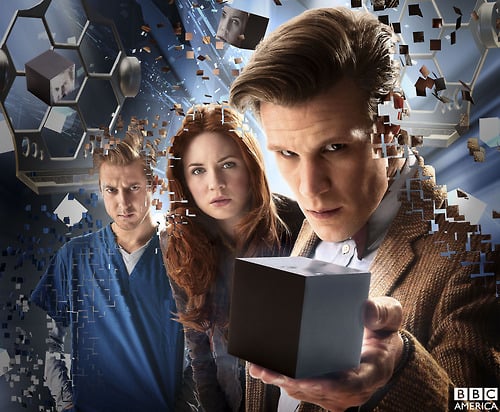
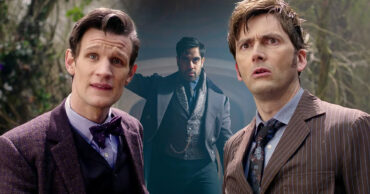
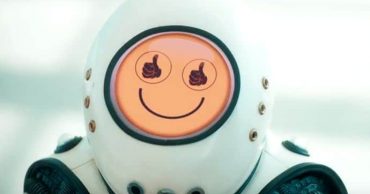
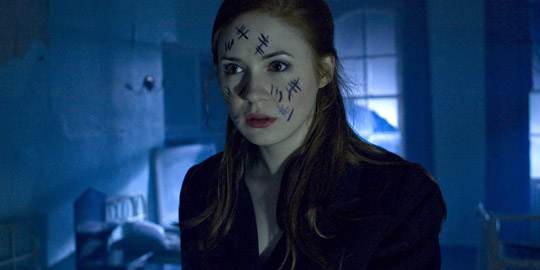
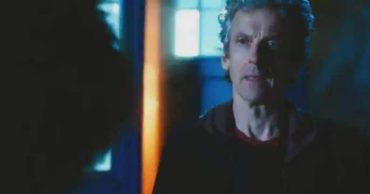
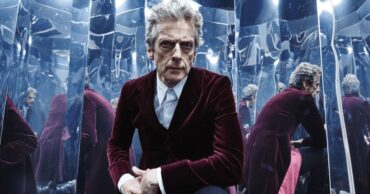
I thought it was Tallulah we heard singing in the alien bar during Jack's scenes? well it was actually!